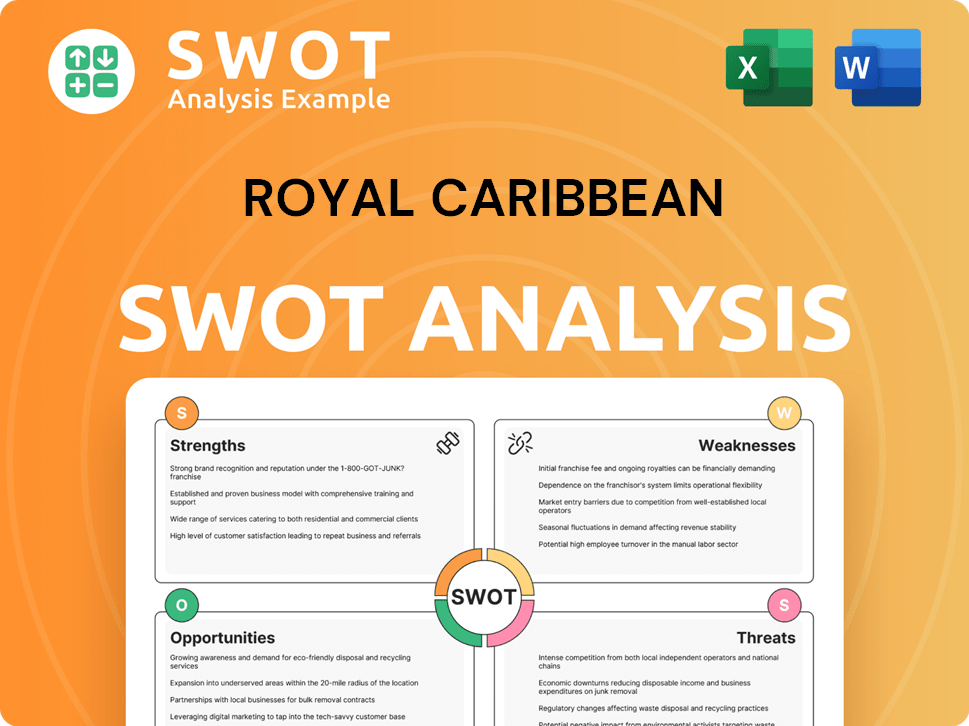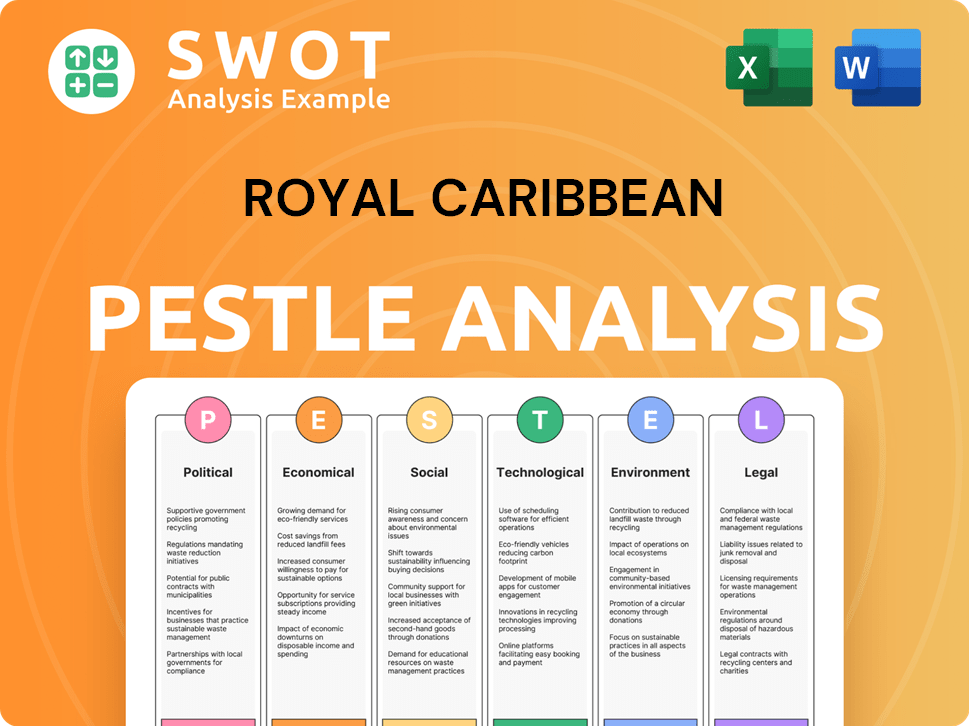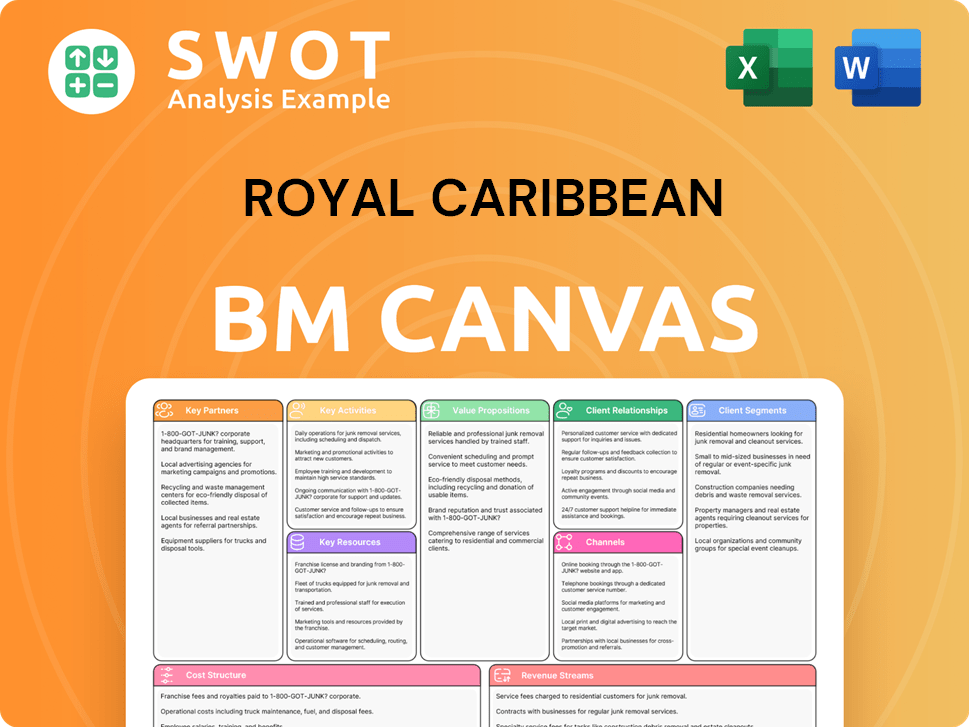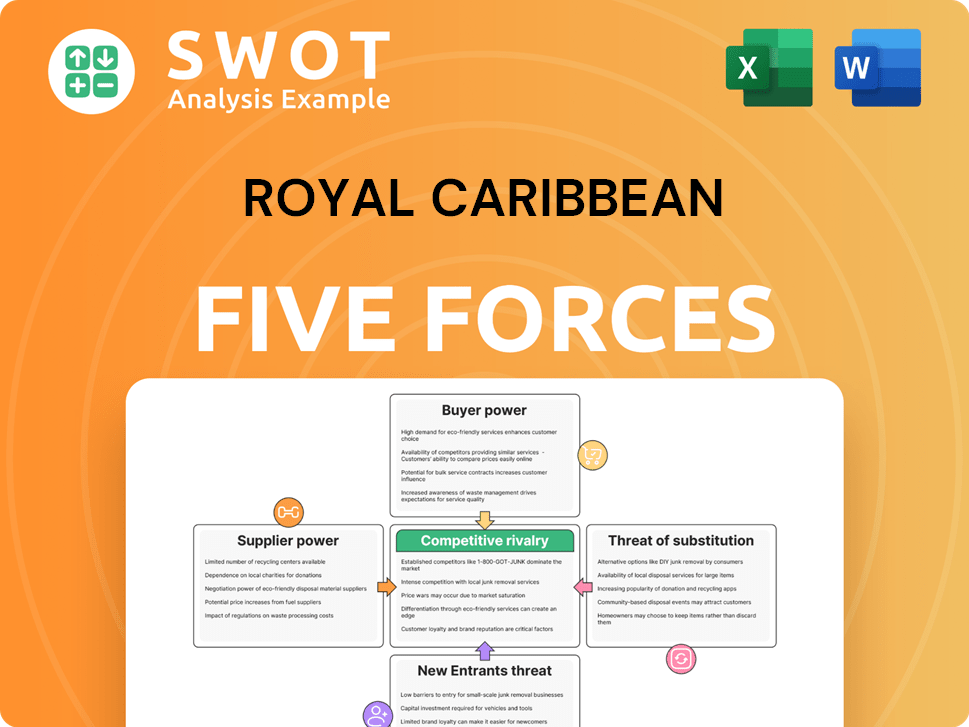Royal Caribbean Bundle
What Drives Royal Caribbean's Success?
Understanding a company's core principles is key to evaluating its potential. Royal Caribbean Group, a leader in the cruise industry, has a well-defined mission, vision, and set of core values. These elements shape its Royal Caribbean SWOT Analysis and overall strategic direction.

This exploration delves into Royal Caribbean's mission, vision, and core values, revealing how they influence the company's culture, strategy, and goals. By examining these foundational elements, we gain insights into how Royal Caribbean navigates the competitive cruise market and strives for long-term success, impacting everything from customer service to employee engagement. Discover where to find Royal Caribbean's mission vision and values and how they are put into action.
Key Takeaways
- Royal Caribbean's mission and vision, focused on exceptional vacations and innovation, drive its strategic direction.
- Core values—people, excellence, purpose, integrity, and impact—shape daily operations and decision-making.
- Investments in new ships and sustainability initiatives like 'Destination Net Zero' reflect strong alignment with principles.
- Financial performance, including 2024 results and the 2025 outlook, demonstrates the effectiveness of its guiding principles.
- Commitment to these principles is crucial for navigating future industry challenges and ensuring long-term viability.
Mission: What is Royal Caribbean Mission Statement?
Royal Caribbean's mission is 'to deliver the best vacations responsibly.'
Let's delve into the heart of Royal Caribbean Group's operations: its mission. Understanding the Royal Caribbean Mission is crucial for grasping the company's strategic direction and its approach to the cruise industry. This mission statement, "to deliver the best vacations responsibly," is more than just words; it's a guiding principle that shapes every aspect of the business, from ship design to guest experiences and environmental practices.
The core of Royal Caribbean's mission is centered on providing exceptional vacation experiences. This customer-centric approach is evident in the company's continuous efforts to innovate and enhance its offerings. The goal is to create unforgettable memories for guests, making their vacations truly special. This focus directly impacts their Royal Caribbean Strategy.
The primary target customers are individuals and families seeking vacation experiences. Royal Caribbean caters to a diverse range of travelers, offering various cruise itineraries, onboard activities, and entertainment options to appeal to different preferences and age groups. This broad appeal helps them compete in a crowded market, as highlighted in Competitors Landscape of Royal Caribbean.
Royal Caribbean's offerings extend beyond just cruise itineraries. They provide a comprehensive vacation experience, including onboard amenities, diverse entertainment options, and unique destinations. This holistic approach aims to create a seamless and enjoyable vacation from start to finish, enhancing the overall guest experience. This contributes to achieving their Royal Caribbean Goals.
The market scope is global, with a fleet of ships traveling to all seven continents. This extensive reach allows Royal Caribbean to cater to a wide range of travelers from around the world, providing diverse itineraries and experiences. Their global presence is a key factor in their success and market share.
The unique value proposition lies in delivering "the best vacations" with a focus on responsibility. This means not only providing exceptional experiences but also doing so in a way that is sustainable and ethical. This dual focus on customer satisfaction and responsible operations sets Royal Caribbean apart in the industry. This is reflected in their Royal Caribbean Culture.
The mission is implemented through continuous innovation in ship design and onboard offerings. The development of innovative ships and private destinations like Perfect Day at CocoCay demonstrates their commitment to exceeding customer expectations. Their "Save the Waves" program exemplifies the "responsibly" aspect, showcasing their dedication to environmental protection. For instance, in 2024, Royal Caribbean invested heavily in LNG-powered ships to reduce emissions, with the Icon of the Seas being a prime example of this commitment. Furthermore, the company has set ambitious goals to reduce carbon emissions by 2035, demonstrating a long-term commitment to sustainability.
In essence, the Royal Caribbean Mission statement acts as a compass, guiding the company's decisions and actions. It emphasizes customer satisfaction, environmental responsibility, and continuous innovation. This mission statement provides a clear framework for understanding Royal Caribbean's strategic direction and its commitment to delivering exceptional vacation experiences while operating responsibly. This commitment shapes their Royal Caribbean Core Values.
Royal Caribbean SWOT Analysis
- Complete SWOT Breakdown
- Fully Customizable
- Editable in Excel & Word
- Professional Formatting
- Investor-Ready Format

Vision: What is Royal Caribbean Vision Statement?
Royal Caribbean's vision is 'to be the most innovative and sought-after cruise vacation company in the world.'
Royal Caribbean's vision statement is a powerful declaration of its aspirations within the global cruise industry. This forward-looking statement encapsulates the company's ambition to lead through innovation and become the preferred choice for cruise vacations worldwide. The focus on innovation suggests a commitment to continually enhance the cruise experience, while the goal of being "sought-after" emphasizes customer preference and brand desirability. This vision drives the company's strategy and shapes its long-term goals.
The vision is inherently future-oriented. It doesn't simply aim to maintain the status quo; it seeks to define the future of cruising. This forward-thinking approach is crucial in an industry that demands constant adaptation to changing consumer preferences and technological advancements. Royal Caribbean's vision statement exemplifies a proactive stance, positioning the company to anticipate and lead industry trends.
Innovation is a central pillar of Royal Caribbean's vision. The company has a history of introducing groundbreaking features, such as rock climbing walls and surf simulators, which have redefined the cruise experience. This commitment to innovation extends beyond onboard amenities, encompassing areas like ship design, entertainment, and operational efficiency, all contributing to the company's Royal Caribbean Mission.
The vision explicitly targets global market leadership. Royal Caribbean aims to be the most desired cruise vacation company, which implies a focus on attracting a broad customer base and achieving significant market share. This ambition drives the company to continuously improve its offerings, expand its global presence, and enhance its brand reputation. The Royal Caribbean Strategy is directly influenced by this goal.
While not explicitly stated, the pursuit of innovation and being "sought-after" implicitly includes a commitment to sustainability and responsible business practices. Royal Caribbean's "Destination Net Zero" strategy, aiming for net-zero emissions by 2050, demonstrates a dedication to environmental stewardship. This focus is increasingly important for attracting environmentally conscious consumers and ensuring the long-term viability of the cruise industry. These goals are part of the Royal Caribbean Goals.
Royal Caribbean's strong financial performance in recent years provides a solid foundation for pursuing its ambitious vision. In 2024, the company reported total revenues of $16.5 billion and adjusted EBITDA of $6.0 billion. This financial strength allows for significant investments in innovation, ship construction, and marketing, all of which are essential for achieving its vision. The Royal Caribbean Core Values support this financial stability.
Being "sought-after" inherently implies a focus on customer service. Royal Caribbean's vision is not just about having the most innovative ships but also about providing exceptional experiences that keep guests returning. This focus on customer satisfaction is a key component of the company's long-term success and is directly linked to its Royal Caribbean Culture. The company's mission and values impact the customer experience.
In summary, Royal Caribbean's vision is a comprehensive statement that guides its strategic direction, emphasizing innovation, global leadership, and a commitment to responsible practices. This vision, supported by strong financial performance and a focus on customer satisfaction, positions the company for continued success in the dynamic cruise industry. Understanding this vision is crucial for anyone seeking to analyze Royal Caribbean's long-term strategy and potential for growth. Where to find Royal Caribbean's mission vision and values is usually on the company's official website or in their annual reports.
Royal Caribbean PESTLE Analysis
- Covers All 6 PESTLE Categories
- No Research Needed – Save Hours of Work
- Built by Experts, Trusted by Consultants
- Instant Download, Ready to Use
- 100% Editable, Fully Customizable

Values: What is Royal Caribbean Core Values Statement?
Understanding the core values of Royal Caribbean Group is crucial to grasping its operational philosophy and its approach to the cruising industry. These values serve as the bedrock of the company's culture, guiding its actions and decisions across all levels of the organization.
This core value emphasizes the importance of valuing diverse teams, individual contributions, and fostering a culture of belonging, trust, and respect. Royal Caribbean prioritizes its employees and guests, striving to create a positive experience for everyone involved. This is reflected in their commitment to diversity and inclusion initiatives, with 48% of its global workforce being women as of late 2024, and in customer service, where they aim to provide exceptional service with a friendly approach.
This value focuses on collaboration, continuous improvement, and creating a positive work environment. Royal Caribbean fosters partnerships and strives for excellence in all aspects of its business, from ship design to entertainment. This commitment to excellence is evident in their ongoing investment in new technologies and their drive to enhance the cruise experience, with over $1 billion spent annually on ship upgrades and innovations.
This core value is about challenging themselves, fostering innovation, and continuous improvement for the benefit of guests, shareholders, and communities. Royal Caribbean invests in sustainable practices and new technologies to reduce its environmental impact and positively impact the communities they visit. This is demonstrated by their commitment to reducing carbon emissions, with a goal to achieve net-zero emissions by 2050, and their investments in local communities, contributing over $50 million annually to various philanthropic causes.
This value centers on honesty, sound judgment, taking responsibility, and operating with the highest ethical standards. This builds trust with guests, employees, partners, and communities. Royal Caribbean Group's recognition as one of the World's Most Ethical Companies for 10 consecutive years by Ethisphere, most recently in 2025, underscores this commitment to ethical conduct.
These Royal Caribbean Core Values shape the company's identity, fostering a responsible, innovative, and people-centric approach to the vacation experience. Understanding these values provides a foundation for analyzing how the company makes decisions and pursues its goals. To further understand how these values translate into strategic action, let's explore how the Royal Caribbean Mission and Vision influence the company's strategic decisions. For a deeper dive into how Royal Caribbean approaches its market, you can explore the Marketing Strategy of Royal Caribbean.
How Mission & Vision Influence Royal Caribbean Business?
Royal Caribbean's mission and vision statements are not merely aspirational; they are the cornerstones upon which the company builds its strategic decisions and operational practices. These statements serve as a compass, guiding the organization towards its long-term goals and influencing every facet of its business, from ship design to customer service.
The core of Royal Caribbean's strategy is deeply rooted in its mission to "deliver the best vacations responsibly" and its vision to be the "most innovative and sought-after cruise vacation company." These statements are not just words; they are the driving force behind significant investments and operational changes.
- Innovation and Technology: The company's investment in cutting-edge ship designs, like the Icon of the Seas, which features a waste-to-energy system, directly reflects its commitment to innovation and responsible operations.
- Sustainability Initiatives: The 'Destination Net Zero' strategy, aiming for net-zero emissions by 2050, is a direct result of the mission's emphasis on responsible practices, demonstrating the company's commitment to environmental stewardship.
- Guest Experience Enhancement: The implementation of personalized services via mobile apps and other technological advancements showcases a customer-centric approach, driven by the vision of being the most sought-after cruise vacation company.
- Financial Performance and Goals: The company's strong financial results, with an Adjusted EPS of $11.80 in 2024 and a projected Adjusted EPS of $14.35 to $14.65 for 2025, are a testament to the successful execution of strategies aligned with its mission and vision.
Royal Caribbean's vision of being the most innovative company is evident in its continuous investment in new technologies and ship designs. The Icon of the Seas, for example, is a prime example of this, incorporating advanced waste management systems and other innovations. This commitment to innovation is not just about attracting customers; it's about setting new standards in the cruise industry.
The 'Destination Net Zero' strategy underscores Royal Caribbean's commitment to responsible operations, a key element of its mission. This initiative, along with the 'SEA the Future' program, demonstrates the company's dedication to minimizing its environmental impact and contributing to a sustainable future. This focus is crucial for long-term success and aligns with evolving consumer expectations.
Enhancing the guest experience is central to Royal Caribbean's mission and vision. The company leverages technology to offer personalized services, such as real-time updates and customized recommendations via its mobile app. This customer-centric approach fosters loyalty and drives repeat business, which is essential for sustained financial performance.
Royal Caribbean's strong financial results in 2024 and the positive projections for 2025 reflect the effectiveness of its mission-driven strategies. The company's ability to deliver exceptional shareholder returns, as emphasized by CEO Jason Liberty, highlights the direct link between its mission and financial success. This demonstrates the practical impact of the company's core values.
Every major decision, from ship design to marketing campaigns, is filtered through the lens of Royal Caribbean's mission, vision, and core values. This ensures that all actions align with the company's overarching goals and contribute to its long-term success. This alignment is critical for maintaining a cohesive brand identity and achieving sustainable growth.
Royal Caribbean's mission and vision also shape its internal culture and employee engagement strategies. The company fosters a workplace environment that reflects its core values, encouraging employees to embody the principles of innovation, responsibility, and customer focus. This contributes to a positive work environment and enhances the overall guest experience.
In conclusion, Royal Caribbean's Revenue Streams & Business Model of Royal Caribbean is deeply influenced by its mission and vision, which guide its strategic priorities and operational decisions. The company's commitment to innovation, sustainability, and customer satisfaction, as reflected in its financial performance and future projections, demonstrates the power of a well-defined mission and vision. To further explore how Royal Caribbean can improve its mission and vision, continue to the next chapter: Core Improvements to Company's Mission and Vision.
Royal Caribbean Business Model Canvas
- Complete 9-Block Business Model Canvas
- Effortlessly Communicate Your Business Strategy
- Investor-Ready BMC Format
- 100% Editable and Customizable
- Clear and Structured Layout

What Are Mission & Vision Improvements?
While Royal Caribbean Group has a solid foundation in its mission, vision, and core values, continuous improvement is crucial to remain competitive and relevant in a dynamic industry. This section explores four key areas where Royal Caribbean's guiding principles could be further enhanced to align with evolving market expectations and industry trends.
To strengthen its commitment, Royal Caribbean could explicitly integrate community well-being and social equity into its core mission or vision statement. This would elevate the importance of social impact beyond its current values and initiatives like 'SEA the Future,' showcasing a more holistic approach. This aligns with the increasing consumer demand for companies demonstrating a commitment to corporate social responsibility; a recent study shows that 86% of consumers expect companies to take a stand on social issues.
The Royal Caribbean vision could be enhanced by specifically referencing its ambition to be a leader in digitally-integrated and personalized travel experiences. This would reflect the rapidly evolving landscape of travel technology and the growing consumer expectation for customized services. Royal Caribbean's investment in technology is evident, with a reported $500 million allocated to digital initiatives in 2024, but explicitly stating this in the vision would solidify its commitment.
As consumer awareness of sustainability grows, the Royal Caribbean vision could incorporate more specific, time-bound targets related to environmental performance beyond the 2050 net-zero goal. This would build upon their progress in reducing carbon intensity and demonstrate a proactive approach to environmental responsibility. For instance, setting a goal to reduce single-use plastics by a specific percentage within a defined timeframe would be impactful.
To ensure the Royal Caribbean Culture thrives, the company could further reinforce its core values by explicitly linking them to employee engagement and development programs. This would foster a stronger sense of purpose and belonging among employees, leading to improved customer service and operational efficiency. A recent Gallup study indicates that companies with highly engaged employees experience 18% higher productivity.
How Does Royal Caribbean Implement Corporate Strategy?
Implementing a company's mission, vision, and core values is crucial for translating strategic intent into tangible results. Royal Caribbean Group demonstrates this through various initiatives, ensuring its foundational principles guide its operations and future endeavors.
Royal Caribbean Group actively implements its Royal Caribbean Mission and vision through strategic business initiatives. The development and launch of innovative ships, such as the Icon of the Seas, exemplifies their vision to be innovative and their mission to deliver exceptional vacations. This ship incorporates advanced environmental technologies, including a focus on LNG fuel and waste heat recovery systems, reflecting their commitment to sustainability.
- Icon of the Seas: This ship is a prime example of the company's vision, incorporating cutting-edge technology and enhanced guest experiences.
- 'SEA the Future' Program: This program is a comprehensive framework for implementing sustainability, community engagement, and innovation, directly linking to their mission and vision.
- Sustainable Technologies: Investments in sustainable technologies and practices across their fleet demonstrate a commitment to reducing environmental impact.
Leadership plays a critical role in reinforcing the company's mission, vision, and core values. CEO Jason Liberty consistently emphasizes the company's commitment to its strategic priorities, including sustainability and enhancing guest experiences. This top-down approach ensures that the values are integrated into the company's culture and operations.
The company's Code of Business Conduct and Ethics outlines the expected ethical standards for all employees, reinforcing the value of integrity. This code serves as a guide for ethical decision-making and behavior, ensuring that employees understand and uphold the company's values in their daily work. This commitment to ethical conduct is a key aspect of their
Royal Caribbean Group communicates its
Formal programs and systems are in place to ensure alignment with environmental commitments and other
Royal Caribbean Porter's Five Forces Analysis
- Covers All 5 Competitive Forces in Detail
- Structured for Consultants, Students, and Founders
- 100% Editable in Microsoft Word & Excel
- Instant Digital Download – Use Immediately
- Compatible with Mac & PC – Fully Unlocked

Related Blogs
- What are Mission Vision & Core Values of Royal Caribbean Company?
- What is Competitive Landscape of Royal Caribbean Company?
- What is Growth Strategy and Future Prospects of Royal Caribbean Company?
- How Does Royal Caribbean Company Work?
- What is Sales and Marketing Strategy of Royal Caribbean Company?
- Who Owns Royal Caribbean Company?
- What is Customer Demographics and Target Market of Royal Caribbean Company?
Disclaimer
All information, articles, and product details provided on this website are for general informational and educational purposes only. We do not claim any ownership over, nor do we intend to infringe upon, any trademarks, copyrights, logos, brand names, or other intellectual property mentioned or depicted on this site. Such intellectual property remains the property of its respective owners, and any references here are made solely for identification or informational purposes, without implying any affiliation, endorsement, or partnership.
We make no representations or warranties, express or implied, regarding the accuracy, completeness, or suitability of any content or products presented. Nothing on this website should be construed as legal, tax, investment, financial, medical, or other professional advice. In addition, no part of this site—including articles or product references—constitutes a solicitation, recommendation, endorsement, advertisement, or offer to buy or sell any securities, franchises, or other financial instruments, particularly in jurisdictions where such activity would be unlawful.
All content is of a general nature and may not address the specific circumstances of any individual or entity. It is not a substitute for professional advice or services. Any actions you take based on the information provided here are strictly at your own risk. You accept full responsibility for any decisions or outcomes arising from your use of this website and agree to release us from any liability in connection with your use of, or reliance upon, the content or products found herein.